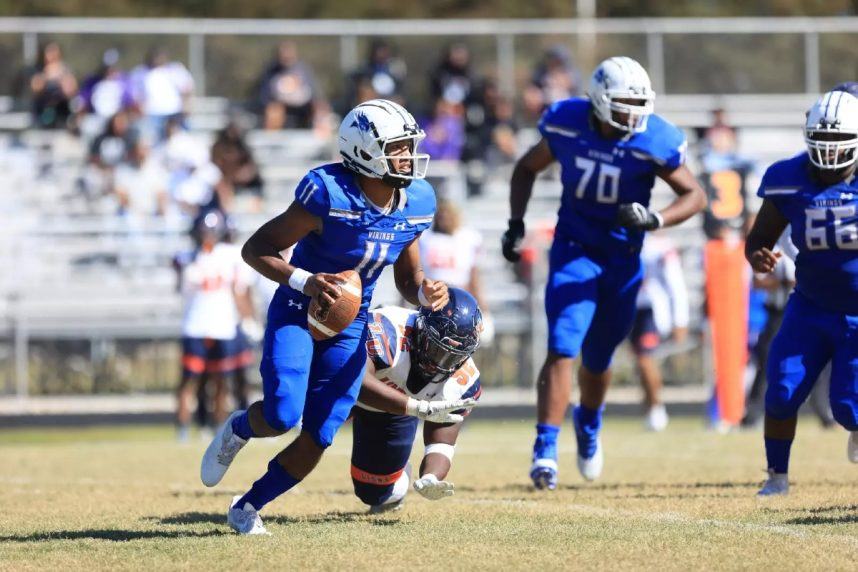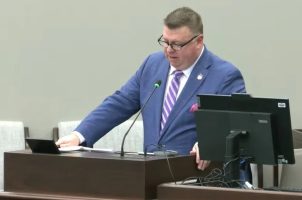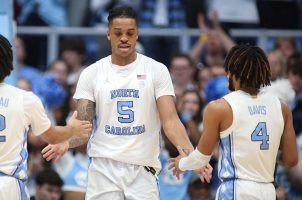North Carolina Online Sports Betting Provides Major Windfall for College Athletics
Posted on: July 30, 2024, 11:02h.
Last updated on: July 30, 2024, 01:08h.
North Carolina online sportsbooks went live in March. Among the biggest winners of the expanded gaming in the Tar Heel State has been its public universities’ athletics departments.

North Carolina’s online sports betting bill signed into law in June 2023 by Gov. Roy Cooper (D) allocates much of the tax money from the expanded gaming for collegiate athletics.
House Bill 347 mandated that the athletics departments of 13 state universities be allocated $300K annually in sports betting tax revenue. Of the 18% online sportsbook tax on gross revenue won by the mobile operators, $2 million annually is to go to the Department of Health and Human Services for gambling addiction education and treatment programs, and another $2 million a year to promote youth and amateur sports programs, grants, and initiatives.
After compensating the North Carolina State Lottery Commission and Department of Revenue for expenses incurred in regulating online sports betting, any remaining proceeds are to further support the 13 state university athletics programs. A new report from the lottery agency reveals there will be plenty of leftover sports betting money to further support the university athletics programs.
Wagering Exceeds Expectations
The North Carolina State Lottery Commission, which regulates commercial sports betting in the state, reports that bettors risked more than $2.23 billion on sports from the March 11 start through June. That includes about $329.7 million in promotional wagers or free bets offered as signup incentives by the eight online sportsbooks.
Gross revenue, or the amount kept by the books, totaled $275.1 million. The 18% tax on the bets won equates to about $49.52 million. The windfall means the state universities included in the sports betting tax allocation will receive much more than they likely anticipated.
Appalachian State, East Carolina, Elizabeth City State, Fayetteville State, NC A&T, NC Central, UNC Asheville, UNC Charlotte, UNC Greensboro, UNC Pembroke, UNC Wilmington, Western Carolina, and Winston-Salem State are projected to receive $820K each — more than double the $300K base — from just the first four months of online sports betting. Full-year estimates are around $2 million per school.
Most of the recipients are smaller schools with smaller AD budgets. The money will provide a significant boost to each program that can be used to improve facilities, recruit, and offset operational costs.
The state’s larger athletics institutions — namely N.C. State and UNC-Chapel Hill — aren’t included in the sports betting tax revenue distributions. Those Division 1 NCAA programs are among the most well-funded programs in the country.
Online Sports Betting Market
North Carolina has issued online commercial sports betting licenses to seven operators — DraftKings, FanDuel, BetMGM, Fanatics, bet365, ESPN Bet, and Underdog Sports. Each company paid the state a $1 million licensing fee that’s good for five years.
Caesars Sportsbook also operates online in North Carolina through its longstanding Class III Native American gaming partnership with the Eastern Band of Cherokee Indians. Caesars Entertainment, which owns Caesars Sportsbook, operates the tribe’s two tribal casino resorts, Harrah’s Cherokee and Harrah’s Cherokee Valley River.
Caesars was deemed exempt from the $1M licensing fee but must share 18% of its online revenue with the state for bets generated from nontribal land.
Related News Articles
North Carolina Budget Trims Number of Online Sports Betting Licenses
North Carolina Opens Sports Betting Application Portal
Most Popular
Oakland A’s Prez Resigns, Raising Questions About Las Vegas Move
Vegas Casino Resorts Install Detectors to Smoke Out Vapers — Report
Most Commented
-
UPDATE: Whiskey Pete’s Casino Near Las Vegas Closes
— December 20, 2024 — 33 Comments -
Zillow: Town Outside Las Vegas Named the Most Popular Retirement City in 2024
— December 26, 2024 — 32 Comments -
Oakland A’s Prez Resigns, Raising Questions About Las Vegas Move
— December 27, 2024 — 9 Comments -
UPDATE: Former Resorts World & MGM Grand Prez Loses Gaming License
— December 19, 2024 — 8 Comments















No comments yet